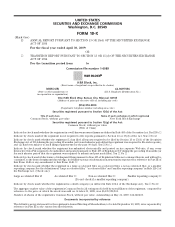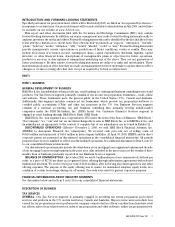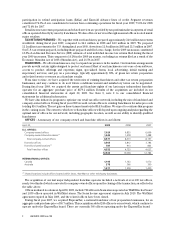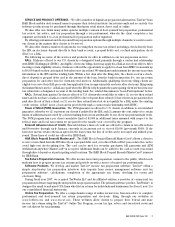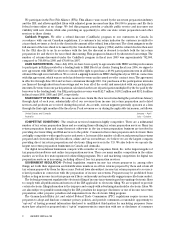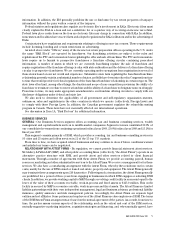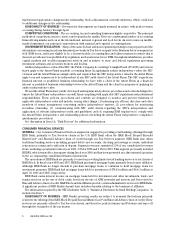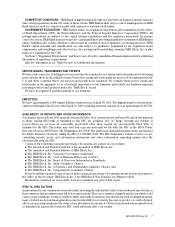HR Block 2009 Annual Report Download - page 12
Download and view the complete annual report
Please find page 12 of the 2009 HR Block annual report below. You can navigate through the pages in the report by either clicking on the pages listed below, or by using the keyword search tool below to find specific information within the annual report.Our businesses may be adversely affected by economic conditions generally, including the current
economic recession.
An economic recession, as we are currently experiencing, is frequently characterized by rising unemployment and
declining consumer and business spending. Poor economic conditions may negatively affect demand and pricing
for our services. In addition, the recent downturn in the residential housing market and increase in mortgage
defaults has negatively impacted our operating results and may continue to do so. An economic recession will
likely reduce the ability of our borrowers to repay mortgage loans, and declining home values could increase the
severity of loss we may incur in the event of default. In addition to mortgage loans, we also extend secured and
unsecured credit to other customers, including RALs and Emerald Advance lines of credit to our tax preparation
customers. We may incur significant losses on credit we extend, which in turn could reduce our profitability.
Our access to liquidity may be negatively impacted if disruptions in credit markets occur, if credit rating
downgrades occur or if we fail to meet certain covenants. Funding costs may increase, leading to
reduced earnings.
We need liquidity to meet our off-season working capital requirements, to service debt obligations including
refinancing of maturing obligations, to purchase RAL participations and for other related activities. Although we
believe we have sufficient liquidity to meet our current needs, our access to and the cost of liquidity could be
negatively impacted in the event of credit-rating downgrades or if we fail to meet existing debt covenants. In
addition, events could occur which could increase our need for liquidity above current levels.
If rating agencies downgrade our credit rating, the cost of debt would likely increase and capital market
availability could decrease or become unavailable. Our unsecured committed lines of credit (CLOCs) are subject
to various covenants, including a covenant requiring that we maintain minimum net worth equal to $650.0 million
and a requirement that we reduce the aggregate outstanding principal amount of short-term debt (as defined) to
$200.0 million or less for a minimum period of thirty consecutive days during the period from March 1 to June 30 of
each year. Violation of a covenant could impair our access to liquidity currently available through the CLOCs. If
current sources of liquidity were to become unavailable, we would need to obtain additional sources of funding,
which may not be possible or may be available under less favorable terms.
The industries in which we operate face substantial litigation, and such litigation may damage our
reputation or result in material liabilities and losses.
We have been named, from time to time, as a defendant in various legal actions, including arbitrations, class
actions and other litigation arising in connection with our various business activities. Adverse outcomes related to
litigation could result in substantial damages and could cause our earnings to decline. Negative public opinion can
also result from our actual or alleged conduct in such claims, possibly damaging our reputation and could cause
the market price of our stock to decline. See Item 3, “Legal Proceedings” for additional information.
Failure to comply with laws and regulations that protect our customers’ personal and financial
information could result in significant fines, penalties and damages and could harm our brand and
reputation.
Privacy concerns relating to the disclosure of consumer financial information have drawn increased attention
from federal and state governments. The IRS generally prohibits the use or disclosure by tax return preparers of
taxpayers’ information without the prior written consent of the taxpayer. In addition, other regulations require
financial service providers to adopt and disclose consumer privacy policies and provide consumers with a
reasonable opportunity to “opt-out” of having personal information disclosed to unaffiliated third-parties for
marketing purposes. Although we have established security procedures to protect against identity theft, breaches
of our clients’ privacy may occur. To the extent the measures we have taken prove to be insufficient or inadequate,
we may become subject to litigation or administrative sanctions, which could result in significant fines, penalties
or damages and harm to our brand and reputation.
In addition, changes in these federal and state regulatory requirements could result in more stringent
requirements and could result in a need to change business practices, including how information is disclosed.
Establishing systems and processes to achieve compliance with these new requirements may increase costs
and/or limit our ability to pursue certain business opportunities.
We are subject to operational risk and risks associated with our controls and procedures, which may
result in incurring financial and reputational losses.
There is a risk of loss resulting from inadequate or failed processes or systems, theft or fraud. These can occur in
many forms including, among others, errors, business interruptions arising from natural disasters or other events,
inadequate design and development of products and services, inappropriate behavior of or misconduct by our
employees or those contracted to perform services for us, and vendors that do not perform in accordance with
8H&R BLOCK 2009 Form 10K



